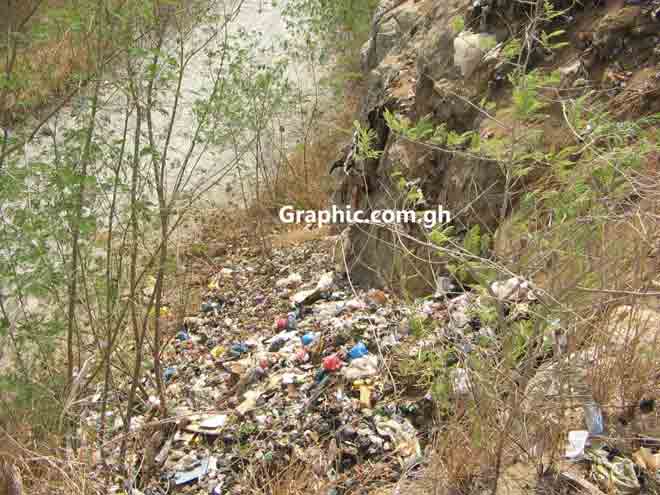
River Densu chokes on dumped refuse
The Densu is one of the most important rivers in the country. It spans three regions and provides water for more than two million people.
Yet, portions of this national asset ave gradually been turned into a refuse dump by some miscreants within its catchment area.
A visit by the Daily Graphic to Weija and other areas within the catchment area of the river revealed tonnes of refuse on the banks, with some visible remnants in the river.
Residents
Some of the residents who spoke to the Daily Graphic on condition of anonymity, said the pollution of the river could affect their health and wellbeing.
“This is a time bomb. We are now in the rainy season and this pollution can lead to a cholera outbreak,’’ one resident said.
Another indicated that the situation could have been averted if the government and local authorities planned properly.
“Many people have encroached on lands closer to the river. These people do not have the right to build around these places, but because this is Ghana, they have the freedom to perpetrate this illegality,’’ another said.
Interestingly, none of the residents the Daily Graphic spoke to admitted dumping refuse near the river or into the river.
“Some residents who are not lawabiding citizens are the ones who dump refuse in the river,’’ another resident said.
Other dangers
Apart from the dumping of refuse, sand winning and quarrying also go on around the Densu.
People also engage in indiscriminate harvesting of wood, while others farm very close to the river.
Although the government has embarked on a major clampdown on illegal mining activities (galamsey) to prevent the destruction of water bodies, a lot more needs to be done to curb other activities negatively affecting the survival of water bodies.
Friends of Rivers and Water Bodies (FRWB), a non-governmental organisation (NGO), has on many occasions called for the concerted effort
of all stakeholders to protect water bodies.
Densu River
According to the Water Resources Commission (WRC), the Densu River Basin has an area of 2,490 km2 and spans 11 local government assemblies in three regions (i.e. Central Region, Eastern Region and the Greater Accra Region).
There are about 200 settlements in the basin with a total population of more than 600,000, equivalent to 240 persons per km2. The figure is
visibly higher than the national average of about 100 persons per km2.
The river takes its source from the Atewa Range near Kyebi and flows for 116 km into the Weija Reservoir before entering the Gulf of
Guinea through the Densu Delta Ramsar Site.
The Densu River is of specific importance since it includes the Weija Reservoir which supplies water to approximately half of the residents in
the Accra metropolis.
Writer’s email:
